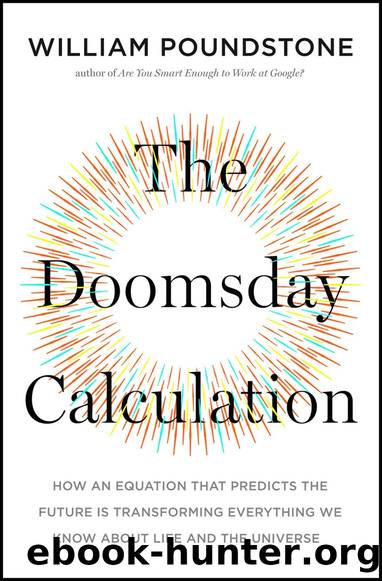The Doomsday Calculation: How an Equation That Predicts the Future Is Transforming Everything We Know About Life and the Universe by William Poundstone

Author:William Poundstone [Poundstone, William]
Language: eng
Format: epub
ISBN: 9787518093342
Google: _TFzDwAAQBAJ
Amazon: 7518093340
Barnesnoble: 7518093340
Goodreads: 98063079
Published: 2019-06-04T00:00:00+00:00
Colonial Williamsburg has an actor playing Edith Cumbo. We know Cumboâs name, and that she was a free black woman, born about 1735, who headed her own household in Williamsburg. No one knows her occupation, what she looked like, or when she died. Cumboâs name appears in various legal documents, none of them jelling into much of a biography. On June 15, 1778, Cumbo sued a certain Adam White for trespass, assault, and battery.
The future will know far more about us than we know about our ancestors. Starting in the early twenty-first century, ordinary people began documenting their lives on social media. Our Facebook and Instagram feeds would be helpful to simulators. Is it just a coincidence that we find ourselves in the social media age?
DNA tests are becoming cheap and popular. The companies offering them swear the results are private. Yet data, once it exists, has a way of turning up and being put to unexpected uses. The Bodleian Plate, an eighteenth-century engraving of Williamsburg discovered in 1929, guided Rockefellerâs reconstruction of the town.
Bostromâs conception of world simulations assumes the development of artificial intelligence that can pass a robust Turing test and behave as a psychologically convincing human. Wrap that code in an avatar, and youâve got a virtual human. A World War II simulation could include representations of Churchill, Hitler, and Roosevelt, embodying everything known about these people. More than that, the simulation could include battles, bond drives, fascist rallies, and USO shows in which every person is a psychologically realized simulation, supplied with name, rank, and serial number taken from military records, and any other information that may survive. Where information is lacking it could be invented to create realistically diverse crowds rather than an army of clones.
One reaction is that this would be an incredible waste of resources. It would, by todayâs standards. But when technology becomes quick, easy, and cheap, we find new uses for it. Those uses are wasteful and self-indulgent (say the older generation). The phone in my pocket is a more powerful computer than those that sent Neil Armstrong to the moon. Most of the time I use it for completely frivolous things.
There could be serious uses for ancestor simulations. Historians might want to explore simulated pasts for research. What would have happened if Truman had not dropped the atomic bombs on Japan? Thousands of simulations could reveal how large and small changes to initial conditions lead to different outcomes. History could become an empirical science. If some leaders were willing to learn from history, that could have immeasurable benefits.
Simulations might become so inexpensive and routine that kids are assigned simulation experiments for history class. They could affect travel. Would you rather vacation in modern Tuscany, with its museums, or in Renaissance Tuscany, meeting virtual Leonardo, the Medicis, and Machiavelli?
Tourists, gamers, genealogy buffs, historical cosplayers, experimental historians⦠There would be a demand for ancestor simulations, and the simulations would outnumber the unique reality. The demographics of Williamsburg provide some support. The town
Download
This site does not store any files on its server. We only index and link to content provided by other sites. Please contact the content providers to delete copyright contents if any and email us, we'll remove relevant links or contents immediately.
| Aeronautics & Astronautics | Astronomy |
| Astrophysics & Space Science | Comets, Meteors & Asteroids |
| Cosmology | Mars |
| Solar System | Star-Gazing |
| Telescopes | UFOs |
Tools of Titans by Timothy Ferriss(8365)
Turbulence by E. J. Noyes(8040)
Secrets of Antigravity Propulsion: Tesla, UFOs, and Classified Aerospace Technology by Ph.D. Paul A. Laviolette(5365)
Astrophysics for People in a Hurry by Neil DeGrasse Tyson(5182)
Room 212 by Kate Stewart(5105)
Design of Trajectory Optimization Approach for Space Maneuver Vehicle Skip Entry Problems by Runqi Chai & Al Savvaris & Antonios Tsourdos & Senchun Chai(5063)
Pale Blue Dot by Carl Sagan(4996)
The David Icke Guide to the Global Conspiracy (and how to end it) by David Icke(4701)
A Journey Through Divination and Astronomy by Publishing Pottermore(4379)
Goodbye Paradise(3798)
Apollo 8 by Jeffrey Kluger(3702)
COSMOS by Carl Sagan(3617)
The Five People You Meet in Heaven by Mitch Albom(3561)
Losing the Nobel Prize by Brian Keating(3534)
How to Read Water: Clues and Patterns from Puddles to the Sea (Natural Navigation) by Tristan Gooley(3460)
Brief Answers to the Big Questions by Stephen Hawking(3429)
How to Read Nature by Tristan Gooley(3335)
The Order of Time by Carlo Rovelli(3188)
A Brief History of Time by Stephen Hawking(3022)
